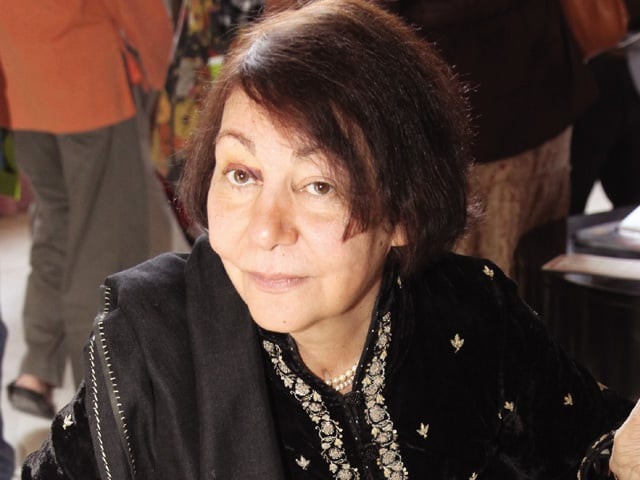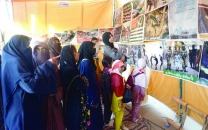‘Get out of our country,’ shouts someone on 9/11 ‘I would,’ replies Sara Suleri. ‘But I’m late for class!’
Sara Suleri Goodyear speaks during erudite discussion titled ‘Forgetful Memories: Chronicles of History’.

Claire Chambers, a lecturer at Leeds Metropolitan University, introduced authors Aamer Hussein and Sara Suleri as “longstanding writers of Pakistan and the diaspora.”
Perhaps because their work preceded the wave of English literature by Pakistani authors that is now in vogue, Hussein and Suleri’s session was only attended by self-confessed fans of their work like Kamila Shamsie. A few minutes before Karen Armstrong’s session, Hussein quipped, “Whoever wants to attend that should leave now!” His reminder prompted at least 20 people to run out.
Chambers asked Hussein and Suleri if their families or friends ever felt “betrayed” when they saw themselves referenced in their work. Suleri, who speaks in a gravelly and measured tone, quipped, “When my father read Meatless Days, he said on Judgement Day I shall ask God to be merciful, for I have already been judged by my child.”
Hussein and Suleri spoke at length about the art of writing and translation, as well as about the challenges associated with it. “Ten pages is as far as I can go,” Hussein said, when asked about writing memoirs. The two writers often have transatlantic exchanges over the meaning of one word.
As for writing about and dealing with cross-cultural relationships, Hussein said the character of Lydia from his book Another Gulmohar Tree, came to him “out of the blue”. Suleri said, “People in cross-cultural marriages should be careful with how they teach language to their offspring,” laughingly recalling how her mother pronounced isabgol as isaaf-gol and believed it derived from the word saaf, as it it cleaned out. Her Welsh mother, exasperated at the washerman Barkat for being late, once exclaimed, “Kya zulm kartay ho!” [What exquisite pain you give me]
Questions of identity - given that both authors work abroad - and language dominated the discussion. “My knowledge of Urdu informs what I do,” Hussein said, but added that his command wasn’t good enough to write in it while Suleri said she always asks her students what language they “dream in”. Hussein recalled how a phrase in his book came from his knowledge of French, and pondered aloud at what languages he dreams in himself. The same questions appear to be on other writers minds as well, since Sadia Shepard also asked Mohammed Hanif what language he thinks in during their discussion later on in the day.
Suleri declared that she “hated” the term American-Pakistani. “I am Pakistani, I am NOT American Pakistani.” Chambers also brought up the idea of making a reference to the events of the 9/11 attacks in their work. Suleri recalled her experience at Yale after 9/11. “Someone had warned me [that day] that I should not wear shalwar kameez [on campus] and I asked, ‘Why should I not wear shalwar kameez?’ So I am running across Yale in my shalwar kameez, when someone threw a stone at me and said ‘Get out of our country’. I replied, ‘I’d love to but I’m late for class!’”
Published in The Express Tribune, February 7th, 2011.



















COMMENTS
Comments are moderated and generally will be posted if they are on-topic and not abusive.
For more information, please see our Comments FAQ